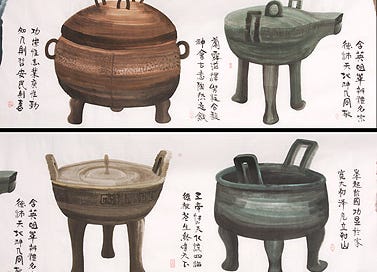鼎の軽重を問う!
問鼎輕重
1.
He intoned the words that all Chinese people of the Diaspora knew by heart:
From Xia to Shang
And from Shang to Zhou
Earth treasures, created in the mists of great antiquity, were prized by Chinese kings and emperors as a symbol of their right to rule. Passed down from dynasty to dynasty, for nearly 10,000 years, the Palace Collection of Art had always been—and would always be—that which granted legitimacy to rulers.
This is from my science fiction short story The Orchid, published last year in the Michigan Quarterly Review. The story grew out of an old obsession of mine about the way art, and other charged objects, can function to legitimize political power, like the crown on a king’s head. In my story, Chinese refugees from a burning earth rebuild on planets in a different part of the galaxy. And the first thing they did was to re-create a national collection of art—anything created on earth having particular power.
The Nine Bronze Tripods in my story are historical charged objects from real history– said to have been cast back in the mists of antiquity– when they treasured by ancient Chinese kings as a symbol of their right to rule. Passed down from dynasty to dynasty– for nearly 2,000 years (or so the story goes) until the time when the First Emperor, Shihuangdi, finally toppled the last Zhou King– and rather than see their transfer to Shihuangdi’s new dynasty– the last Chu King flung the nine bronzes forever into the River Si. Given their symbolic significance, Shihuangdi actively attempted to dredge up the sacred bronzes from the river, but it was to no avail; and scholars of later dynasties saw this as further evidence of the lack of moral virtue of the First Emperor.
This is a relatively well-know story in Japan with the expression 鼎の軽重を問う still showing up in essays or articles to disparage a person who asks about questions someone else’s authority, especially when a junior questions a senior or when someone lacking in authority shoots about their weight, etc.
2.
I was thinking about this during Kamala’s speech at the Convention the other night when she was talking about the greatest military force in the history of the world… and how America is the greatest story ever told.
A bit disappointing to hear the old tired lines.
Also I guessed the transfer of power, in this case will not be art works but Gold Codes (aka Biscuit?)
3.
There is a well-known story about the bronzes (maybe less well-known among younger people) which supposedly took place at the start of the Eastern Zhou Period (770-256 BC). Severely weakened by external and internal threats, the Zhou kings came to rule in name only. Although the Zhou dynasty was the acknowledged recipient of the so-called Mandate of Heaven and therefore possessor of the Nine Tripods, the real political power was held by the kings and generals of various surrounding kingdoms, chiefly those of the Qin, Qi, Chu, Wei and Yan.
The Chu were especially troublesome, and after some showy military displays near the Zhou capital of Luoyang, the worried Zhou king dispatched his trusty Minister, Wáng-sūn Mǎn (王孫満), to negotiate for peaceful relations with their southern Chu neighbors.
Arriving at the military camp outside the capital, the belligerent Lord of Chu immediately asked Minister Wang about the size and weight of the Nine Tripods (問鼎之輕重)– thereby implying that with their transfer to the House of Chu, the Mandate of Heaven would also be transferred to Chu.
Minister Wang–always quick of wit– sharply responded that unless it could be shown that the Will of Heaven had in fact changed, then it was forbidden to inquire after the weight of the tripods. He then went on to explain that the actual weight of the tripods was beside the point–for in fact, their weight corresponded directly to the virtue of the king who had them in his possession; that is, if the ruler truly held the Mandate of Heaven then the tripods would be immovably heavy. However, should a ruler lack virtue, the tripods would become weightless and therefore meaningless as a political and psychological symbol.
He then drove in his point: The tripods do not matter, virtue does.
The Lord of Chu, moved by the Zhou minister's logic, was thus convinced of the righteousness and virtue of the Zhou Dynasty and a tentative peace was agreed to.
Shihuangdi’s reign lasted a mere 15 years, and it was followed by the Han Dynasty (206 BC-AD 220). Contemporaneous with the Ancient Roman Empire, the Han Dynasty was one of the most prosperous and comparatively harmonious times in all of Chinese history. And, just like in Roman times, the greatness of the Han saw its proof in the fact that ancient bronzes began to emerge from the earth in a fashion a little short of miraculous. This dynasty, where the arts and philosophy flourished, is looked upon as one of China’s past “golden ages.”
Oh to talk of art and virtue….
++
Above based on Japanese sources, so any China experts out there should please feel free to correct anything, including who through the bronzes into the river and what the river was called…






Have you read Justinian Huang's novel? The Emperor and the Endless Palace? I found the Chinese history within to be delightful.
Shihuangdi. I’m sure this is absolutely correct. But as an aside, in my experience Japanese usually refer to him as 秦の始皇帝 (Chin no Shikōtei) whereas in modern Mandarin he’s normally called 秦始皇 (Qīnshǐhuáng)….